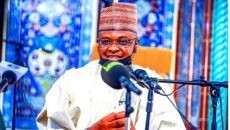The telecoms revolution was one of the signatures of Nigeria’s first 100 years while broadband is being positioned to be the anchor of the nation’s technology push in the second century
When Ernest Ndukwe, immediate past executive vice chairman, EVC, of Nigeria Communications Commission, NCC, was leaving office in 2010, he predicted that broadband would be the next frontier in the telecommunications revolution in Nigeria. After building a regulatory institution that won international recognition and respect, making telecoms services available and increasingly affordable, NCC has turned its attention to the development broadband in the next phase of the telecom revolution in Nigeria.
Broadband is a super-fast, high-capacity Internet transmission technique using a wide range of frequencies, which enable a large number of messages to be communicated simultaneously. The term broadband includes a broad range of technologies, all of which provide higher data rate access to the Internet. These technologies use wires or fibre-optic cables in contrast to wireless broadband. According to industry standard, broadband refers instantaneous bandwidths (signal processing) greater than 1 MHz and supporting data rates greater than about 1.5 Mbits/s.
The Nigeria telecoms market was opened up in 2001. Over the years NCC has earned a reputation as a foremost telecoms regulatory agency in Africa. The Commission is catalysing the use of information communication technologies, ICTs, for different aspect of national development. It has initiated several programmes such as State Accelerated Broadband Initiative, SABI, and Wire Nigeria Project, WIN, “to help stimulate demand and accelerate the uptake of ICT tools and services necessary for the enthronement of a knowledge society in Nigeria.”
The Commission was created by Decree 75 of 1992 while the first board was established in 1993 but it could not prosper under the military. With the return of democracy in 1999, one priority area was to improve telecommunication services in the country. By April 3, 2000, the then government of Olusegun Obasanjo inaugurated the second board of the Commission. The mission was clear and insistent: “To support a market driven telecommunications industry and promote universal access… through the consistent enforcement of clear and fair policies that protect stakeholders, ensure efficient resource management, share industry best practices and deliver affordable, quality telecom services.”
Since 2001, the telecoms revolution in Nigeria has been a hit. The tele-density has grown to about 80 per cent, up from a paltry 400,000 lines to over 100 million today. The Commission is targeting 95 per cent tele-density. Crucial impact has been made in direct and indirect employment of Nigerians. The sheer economic impact has been massive, though challenges persist.
Eugene Ikemefuna Juwah, replaced Ndukwe as the new EVC of NCC on July 29, 2010. The responsibility then fell on his seasoned shoulders to take the Nigeria telecoms industry to the next level. Juwah, like his predecessor, came with a long pedigree in the sector. A former executive director of Network and Operations with MTS Wireless, he had over 30 years’ experience, 20 years of which was at the management level, in information technology and telecommunications with more than. He had experience in digital exchanges, base station, data communication and subscriber access networks construction and operations. He had played coordinating roles in the set up of ETACS, GSM and CDMA Mobile Networks in Nigeria and has deep knowledge of pricing, billing, interconnection, licensing and regulatory affairs and network fraud control within the Nigerian environment. He therefore fitted the bill.
Among so many other things the NCC under Juwah is doing to expand and better telecoms services in Nigeria, Broadband development appears the next big thing in the sector because of its immense potential. On Tuesday, February 24, at a Nigeria Broadband Forum organised by the NCC, Juwah regretted that Broadband penetration in Nigeria is less than seven per cent despite the huge successes recorded so far in the telecoms industry. To take advantage of this huge technology gap, NCC is targeting a larger segment of the population for Broadband penetration. According to him, the Commission is using a utility model, equal access model and passive infrastructure model as Open Access Model to push Broadband penetration.
Omobola Johnson, minister of communication technology, at the Commonwealth Telecommunications Organisation conference in Abuja recently, assured investors that the federal government is addressing the infrastructure deficits to support broadband deployment while the Commission would address issues of accessibility and affordability. To this end, government would establish a Presidential Committee to develop a standard Broadband strategy and roadmap for Nigeria. This underscores government’s realisation of the importance of Internet capacity and a national backbone that provides critical ICT infrastructure to carry data traffic to all parts of the country. Universal access to Broadband is becoming a significant indicator of development and competitiveness among nations. It has the potential to power entire new industries and support significant efficiencies in education, health care provision, energy management, public safety, government/citizen interaction and the overall dissemination of knowledge.
“In Nigeria, there is already clear evidence of demand for Broadband in many facets of our economic and social lives. There are very few aspects of our lives that are not impacted or affected by the Internet. So, the demand is there, so is the supply when you take into consideration the Internet capacity that we have landed on our shores. The challenge for us in Nigeria is not the proverbial last mile but the last hundreds of miles, taking that landed capacity to cities, communities, institutions and homes,” Johnson said.
Johnson further captures the broadband enthusiasm: “It appears to me that there is not a week that goes by without an event in Nigeria where Broadband is being discussed.”
The opportunities that Broadband access provides are enormous. Every 10 per cent increase in access to Broadband in developing countries results in a 1.38 per cent increase in the gross domestic product, GDP. It is well advised that any country seeking growth, job and wealth creation should increase access to Broadband. United States, US, and United Kingdom, UK, are making significant investments in Broadband access. Recently the UK budgeted £362 million to improve Broadband connections in 90 per cent of hard to reach communities not catered for by the private sector by 2015. Likewise, the US Congress has approved the expenditure of $2.5 billion in the Recovery ACT Fund to deploy Broadband services, through fibre, to rural and underserved communities.
Currently, Nigeria has about 45 million Internet users. This represents 28 per cent Internet penetration. Be that as it may, only nine per cent, 14.5 million people are Internet subscribers; while Broadband penetration is only about seven per cent. Statistics show that most Nigerians access Broadband using mobile smart phones. Because of the lack of access to Broadband and the cost most Nigerians access the Internet through public venues like offices, cyber cafes and computer labs. At between N8 and N10 per five megabytes of data, Nigeria has one of the highest Internet rates and the slowest speed in the world and NCC wants to expand access-coverage, increase speed and crash cost through a National Broadband Initiative. The government is creating the enabling environment for accelerated Broadband roll out.
According to the minister of communication, Nigeria is looking at Broadband from four perspectives: a critical national ICT infrastructure; a catalyst for economic growth; a means of social inclusive development; and a tool for effective governance. In the next five years the goal is to achieve one national Broadband network able to deliver to users at least 50 per cent of the global speed average
The ambitious targets for government are: to facilitate the build out of a national integrated network to distribute the massive capacity from undersea cables; encourage and enforce the principle of open access/infrastructure sharing to already built transmission networks in order to facilitate an integrated national backbone; expanding the build out of an integrated national backbone to achieve point of presence in all local government areas; and adopt a progressive fibre build out to connect all state capitals, achieve PoP in all LGs and create city rings in all major cities. Nigeria is not just building any other national backbone but a heterogeneous one with three main applications: wireless, wired and satellite resources.
Broadband as a catalyst for Nigeria’s economic growth is targeted to increase ICT contribution to GDP by at least 1.5 per cent by 2015. In addition to stimulating economic growth, Broadband would create much needed jobs, develop local content in mobile applications, media, grow online business and support entertainment.
Broadband will also come good as a means for inclusive social development. In this case, it would help government deliver services through the Internet, more popularly known as e-government and m-government. It would also improve government/citizens engagement. It would create a single window portal to facilitate easy access to government information. To this end, all government ministries, departments and agencies are to have functioning publish and inform websites of the same/similar standards by the end of 2014.
Juwah says the Nigerian National Broadband Plan submitted by the Presidential Committee on Broadband has been approved by the President for implementation. The strategy is to promote widespread Broadband deployment, increase Broadband adoption, usage and ensure availability of Broadband services at affordable prices.
“It is intended over the period of these plans to see more than a five-fold increase in the Internet and Broadband penetration figures. It is also intended that all state capitals and urban cities have metro fibre infrastructure installed. Certain estates and business districts within major cities shall have fibre in their homes or premises; whereas on a national scale, it is the intention of government to facilitate full roll-out by operating companies of 3G networks with the potential for immediate transition to 4G/LTE as spectrum becomes available”, he confirms.
To realise all these notable plans NCC has to address convincingly some common challenges which ICT operators in the country have identified as hindrances to optimum performance. These are: high cost of rights of way, which leads to high cost of lease and transmission; long delays in obtaining permits, backhaul capacity constraints, multiple regulation and taxation at federal, state and local government levels, damage to fibre infrastructure during roadworks, inadequate public electricity supply, lack of major green energy initiatives and supports. Government is already addressing these issues. It recently got Lagos State to crash the charge on right of way.
An independent report by Analysys Mason on opportunities in Nigeria’s telecoms industry estimates a 55 per cent annual growth from the online retail industry, from N4.5 billion in 2010 to N44.9 billion in 2015. When these potential are realised, Broadband would define business and leisure in Nigeria in the next century.
Follow Us on Social Media







 WhatsApp us
WhatsApp us